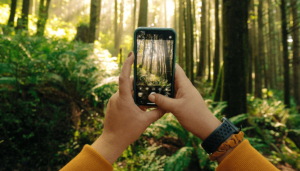
Best Allergy Tracker App 2025
Allergy Tracker App The best apps for tracking allergies in 2025 Published on March 31st 2025 Written by Jesse Driessen Living with allergies—whether triggered by
Published on August 30th 2022.
Written by Jenna Farmer.
Chapters.
1. Pets | 2. Meditation | 3. Writing | 4. Movement | 5. Gardening | 6. B-Vitamins | 7. Fibre
Whether you live with specific forms of anxiety – such as health anxiety or social anxiety – or even general anxiety disorder, you’re definitely not alone.

Over 40 million people in the US (and 8 million people in the UK) struggle with anxiety and google recently reported that more and more of us are searching for advice on our mental health and finding the right coping mechanisms for anxiety.
Whilst you can’t necessarily banish anxiety forever, you can try to equip yourselves with the right coping skills for anxiety to help manage it more effectively- so you can get back to living your life instead. Here’s some of our favourite science-backed coping strategies for anxiety.
Did you know spending time with your pet can actually help with anxiety? Being in contact with animals is thought to help calm our nervous system and there’s actually scientific proof that being close to animals is a good thing: one study involved a group of students spending ten minutes petting cats and dogs (our idea of heaven!) and found that this lowered their anxiety and levels of the stress hormone, cortisol.
This study shows you don’t need to own a pet to feel the benefits-you might offer to walk a neighbour’s dog or cat sit for your friend once a while. However, if owning a pet is possible for you it could be a good idea, since one survey even found owning a pet boosted your happiness by 22% on average.
We’ve all heard about mindfulness but can it actually help your anxiety? Well the science says yes. A huge overview of studies found that mindfulness meditation programs had moderate evidence of improving anxiety, one study in particular found meditation benefited the anxiety symptoms of general anxiety disorder, as well as coping with stress in general.
The good news is that meditation doesn’t have to mean sitting in silence for hours on end-hurrah! Turns out, meditation can be as simple as a few minutes focusing on one thought.
“Meditation is a fantastic tool in proactively taking care of our mental health. You can get started with just three minutes of mindfulness meditation through breathing. Bring your attention to the sensation of your breathing, notice filling up your lungs and your ribs, chest and lungs move. Counting can help you focus, so if you need to count your breathing, breathe in for five seconds, hold for 6 and then breathe out for 7 seconds,” says award-winning mindfulness teacher Amy Polly.
Another simple coping mechanism for anxiety is to write down your feelings. Sometimes this may be just a case of picking up a pen and seeing what comes out, whilst other times you might wish to use specific journal prompts. This can be particularly useful when combined with CBT, with an effective exercise being to ‘challenge’ a negative thought and then write down a more realistic alternative to replace it with.
If you’re not a ‘pen to paper’ type of person, then you can also use an app like Bearable to jot down what you are grateful for and any thoughts you’re currently feeling. The art of journaling for fifteen minutes a day three times a week has been shown to boost your mental wellbeing.
Sometimes when we’re in an anxiety-hole, exercise is the last thing we feel like doing but it’s actually one of a few really useful coping strategies for anxiety. Not only does it give your body a boost of feel-good endorphins but it can help as a distraction from intrusive thoughts and provide routine as part of a self-care routine. Tons of studies have found evidence exercise positively impacts anxiety but it’s all about finding the right exercise for you.
Aerobic exercise (e.g. the type that gets your heart beating faster) is thought to be the most useful – think dancing around your living room or even power walking around the park – but yoga can help too: one study of 52 women found both anxiety and stress decreased significantly after 12 sessions of Hatha yoga.
As always, it’s important to work with your body and its physical capabilities: for example, you may choose to opt for adapted exercises, such as seated workouts, if you have mobility issues. For those with chronic fatigue, you may need to increase length and intensity of your exercise slowly-some people may find warm water exercises helpful as this provides less stress on the joints.
If we had a dollar for every time someone told us ‘just get out in the fresh air,’ we’d be able to hire a live-in therapist. Unsurprisingly, good mental health isn’t quite as simple as that but gardening can be a pretty great coping strategy for anxiety for a few reasons. It offers a real sense of accomplishment and purpose, and is a great excuse for a phone-free hour.
Gardening is much more affordable than many activities: forget an expensive gym membership, you just need a bit of green space! Whether you have a dedicated spot at your local allotment or just like tending to the flowers on your balcony, the benefits are still the same. In fact, even taking care of indoor plants is thought to help with stress.
Don’t worry if the act of gardening itself takes up too much energy however, simply being around green space more regularly can really help – a study by the University of Exeter found that those who moved to green areas in general (e.g. having more access to gardens and parks) improved their mental health.
Whilst we all aim to get the vitamins and minerals we need from a healthy diet, it’s not always possible, whether that’s due to dietary restrictions or fatigue meaning you just don’t have the energy to whizz up a superfood smoothie today. One group of vitamins that are often linked to our mental health are B vitamins. Biotin (otherwise known as B7) is known for helping your hair grow longer but it’s also been shown those who have higher levels of it had lower odds of getting anxiety of depression.
B1 and B5 also slash your anxiety risk and research has found B6 supplementation was found to reduce anxiety. This is because these vitamins are all involved in our brain function. The good news is you may not even need to supplement: one study that involved people tucking into yeast based spread had improved anxiety scores. Great news if you’re a marmite fan like us.
“Eating a varied diet should ensure you get the right levels of B vitamins as they are widely available in food. However. vegans need to supplement with B12 because it’s only found in animal products” explains Nutritional Therapist Anna Mapson
There’s no one diet that can banish your anxiety but there has been some research that suggests some foods and drinks are more helpful than others. When we’re super anxious, we may instead skip meals and turn to sugary snacks, which isn’t ideal.
“Anxiety can be made worse with a high sugar diet that’s low in fibre as this causes blood sugar crashes. Opting for wholegrains and high fruit and vegetable intake keeps your diet high in fibre and helps to keep your blood sugars balanced which can help reduce anxiety,” explains Nutritional Therapist Anna Mapson of Goodness Me Nutrition.
You don’t necessarily have to follow this diet permanently but it could be an idea to eat a dinner or lunch that centres around these foods when you’re anxious, since whole grains, protein and veggies all help keep our blood sugar steady.
We hope these simple science-backed tips have given you some ideas to get started in getting to grips with your anxiety and get back to living life to the fullest. Whichever of these strategies you choose to implement into your daily life, remember that you can use Bearable to learn how they impact your anxiety, mood, sleep, energy levels and any symptoms you’re experiencing.
Disclaimer. The information provided is for educational purposes only and is not a substitute for professional medical advice. Consult a medical professional or healthcare provider if you’re seeking medical advice, diagnoses, or treatment.
Help someone by sharing this article with them …

Allergy Tracker App The best apps for tracking allergies in 2025 Published on March 31st 2025 Written by Jesse Driessen Living with allergies—whether triggered by

Seasonal Affective Disorder and Depression Published on November 5th 2024Written by Jesse Driessen What is Seasonal Affective Disorder? Approximately 15 million Americans are thought to

PoTS App The top 5 apps for tracking PoTS in 2024 Published on October 24th 2024Written by Jesse Driessen Living with Postural Orthostatic Tachycardia Syndrome